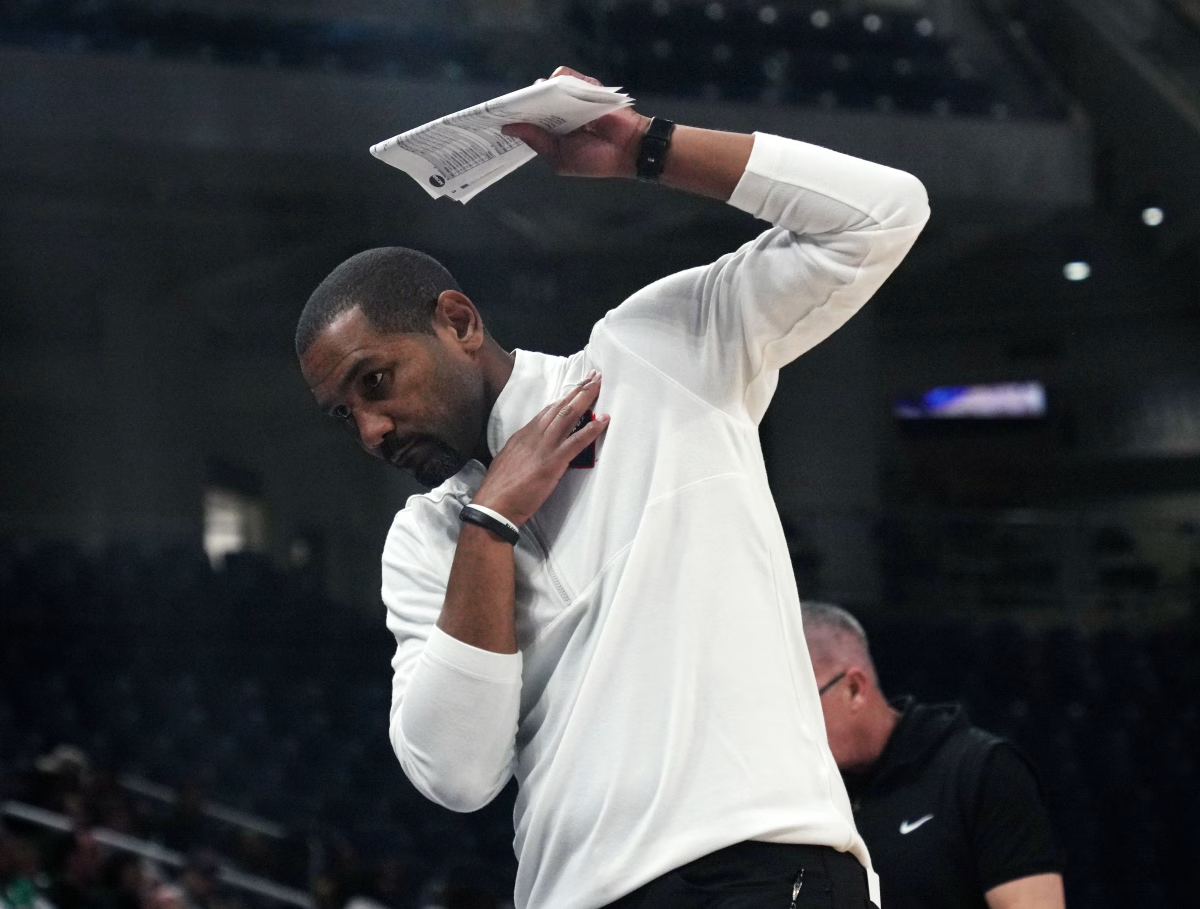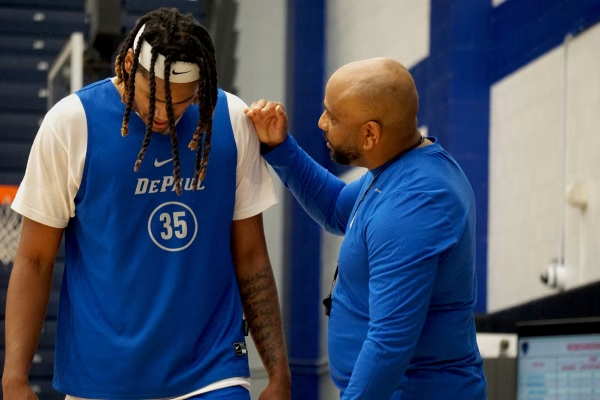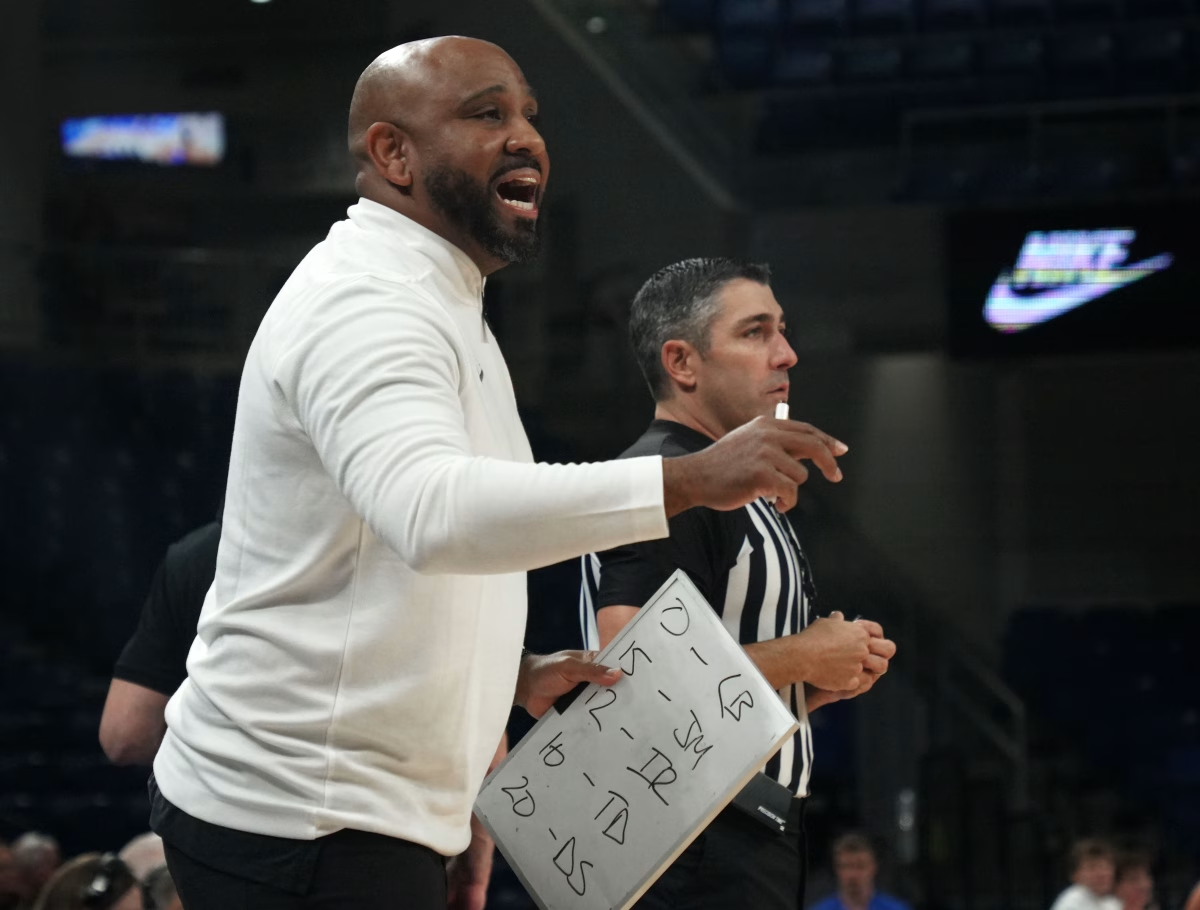We have all heard the phrase “too many cooks in the kitchen.”
DePaul men’s basketball practice on Monday, Oct. 7, sounded like the kitchen. As the still-freshly-assembled Blue Demon players scrambled across the court, whipping the basketball around like a hot potato, commands rained in from all four corners of the court.
DePaul’s coaching staff, led by head coach Chris Holtmann, is the only one in college basketball that has five or more coaches with previous D1 or NBA G League head coaching experience.
Though this collection of coaching talent may sound like a headache, especially considering the roster had no returners from last year for the first time in DePaul’s history, the staff say Holtmann had a plan all along.
“Coach Holtmann had a pretty clear vision for how he wanted to build the program,” assistant coach Bryan Mullins said. “I think character obviously was (goal) number one in terms of the type of people we wanted to recruit.”
Mullins, former head coach at Southern Illinois from 2019-2024, said goal number two for recruiting was roster continuity and goal number three was skill, competitiveness and toughness. So, they were not only looking for the best talent and best character, but also the fountain of youth.
They may have accomplished goal number two. Out of the 10 non-freshmen players on the roster, only three are out of eligibility after this season: forward David Skogman and guard Isaiah Rivera, as well as Southern Illinois transfer Troy D’Amico, whom Mullins undoubtedly played a large part in recruiting.
Mullins said Holtmann reached out to him soon after being let go by Illinois State in March.
“The opportunity to build something special here and leave a legacy, get this program back to where it belongs,” Mullins said. “I think the challenge of that really excited me in this next chapter for me.”
Within the loud, chaotic practice space in McGrath-Phillips Arena, Mullins leans offensive when it comes to coaching this team, taking the foundation he and his fellow coaches have built with new talent and applying a focus on pace and speed.
“We’ve recruited the skill in terms of the shooting to be able to (play fast), and now we’re just trying to get the guys all connected on the offensive side of the ball,” Mullins said.
Recruiting shooters was certainly a focus for the staff during the spring because it allows that faster, more spread out offensive approach that Mullins visualizes.
“I think it’s something that’s going to be a big staple for this program moving forward as well,” he said.
Mullins said one positive of the previous head coaching experience in the room is that each coach brings a different perspective, calling things differently and running different actions, but the key has been getting on the same page and “speaking the same language.”
“It’s like a coaching clinic in here every day with the resources we have from one office to the next, and just to be able to pick each other’s brains and talk about each other’s experiences, it’s been great,” Mullins said. “It’s a credit to (Holtmann) obviously for the type of people that are attracted to him and want to work with him.”
Holtmann said previous head coaching experience was “not a requirement” when recruiting his brand new staff.
“What I tried to do is find the best fits and the best coaches,” Holtmann said. “And I think a byproduct of that is we have some guys who have some experience in head coaching, and all of them bring real strengths and understanding of how we want to play.”
The coaches do have a number of connections among them. Assistant coach Jack Owens joined Holtmann at Ohio State after a head coaching stint at Miami Ohio, while long before Mullins became head coach at Southern Illinois in 2019, Owens was an assistant with the same program from 2003 to 2008.
While Holtmann and assistant coach and general manager LaVall Jordan have never coached together, Jordan was the next Butler head coach after Holtmann departed for Columbus.

Fellow assistant coach Paris Parham became an assistant coach for the University of Wisconsin–Milwaukee the year after Jordan left for Butler. Parham also shares a DePaul connection with assistant coach Brandon Bailey, who came with Holtmann from Ohio State as a DePaul alumnus, graduating in 2009 and was a student manager under Doug Bruno and the women’s basketball team.
Across from Mullins’s offense on the sidelines stands Bailey, whose sole interest is the future of DePaul’s defense. Bailey, the least experienced of the coaching staff, has only coached college basketball for one year, previously head coaching the G League affiliate of the NBA’s Boston Celtics, the Maine Red Claws.
“He’s seen really good players, he’s really smart and a very good teacher,” Holtmann said. “I think being in this role for a year will really help him in college now going into year two, and I’m excited to have him.”
Only one of these coaches was here last year: Paris Parham. Now entering his fourth year at DePaul, Parham initially came to Lincoln Park the same year as former head coach Tony Stubblefield, the only coach or player to remain since Stubblefield’s firing in January, and he is described by Mullins to “know everybody” in the basketball world of Chicago.
He added that Parham was a huge recruiting asset, putting large amounts of effort into hospitality for potential recruits and using his knowledge of the program’s history and tradition to attract high-level talent to DePaul. One such player, freshman guard Chris Riddle, is the only player on DePaul’s roster that committed to the school before Holtmann was hired.
Parham and Riddle met when the coach began recruiting the young star during his sophomore year of high school. Riddle says Parham was a significant reason for his initial recruitment, as well as his decision to stay after Stubblefield’s firing.
“Just to keep going, play hard,” Riddle said of what Parham had told him during the coaching change, an uncertain time at DePaul that often forces players out. “Be truthful to myself. I’m already a hard worker. I already love the game. I already want to learn. I’m already coachable.”
Parham’s passion for DePaul’s history is a huge motivator for his recruiting, especially a player like Riddle who was also eyeing other Chicagoland universities during high school.
“Those other schools are good, but this is DePaul,” Parham said. “We struggled for a while here, but this is still DePaul University in the Big East.”

Though the team has until Dec. 10 to prepare for Big East Conference play, DePaul is getting ready for the ultra-competitive landscape that faces them.
“You look at the head coaches right now that are in the Big East,” Mullins said. “It’s like a hall of fame lineup of basketball coaches. There’s just no nights off.”
Despite this looming task, Mullins believes his team has time to develop a “mindset of growth” during the non-conference portion of the schedule that takes them forward and allows them to get better every day. The facilitators of this project, the coaching staff, still have much to do.
Six new coaches from six different backgrounds, their interconnected stories all leading to this moment. It’s a clean slate for everybody, and now it’s up to them to turn DePaul basketball around and create a culture of excellence.
“Everybody has got unique experiences that’s on this staff,” Parham said. “We’re just all like one big family.”
Related Stories:
Holtmann bolsters roster with three more transfers and multiple coaches
Basketball head Chris Holtmann embracing Lincoln Park, clean slate
DePaul makes unwanted history, becomes first Big East team to lose 20 conference games



